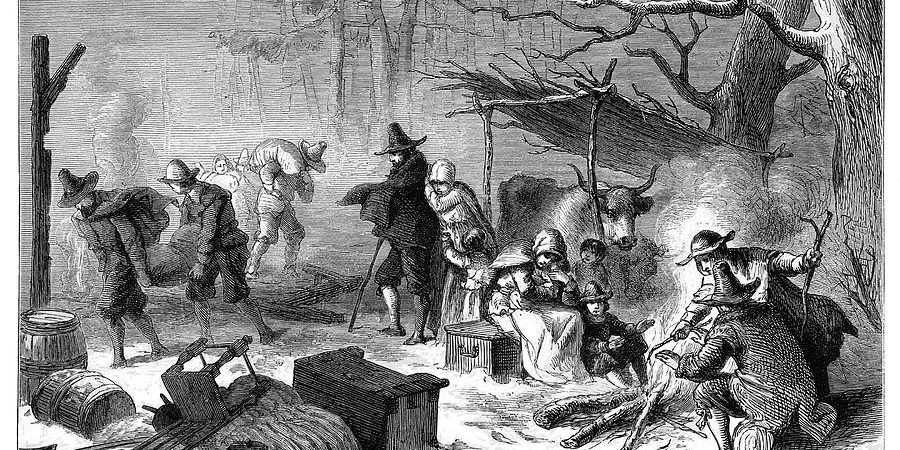Beginning in January, 1621, after enduring a very difficult voyage, one of the most remarkable testimonies in the midst of suffering by the Pilgrim church began to take place. They had already elected John Carver as Govervor after the Compact had been signed. Now that they settled on a spot to establish their Colony, however, the suffering began.
Bradford relates: that which was most sad and lamentable was, that in two or three months’ time half of their company died, especially in January and February, being the depth of winter, and wanting houses and other comforts; being infected with the scurvy and other diseases which this long voyage and their inaccommodate condition had brought upon them. So as there died some times two or three a day in the foresaid time, that of 100 and odd persons, scarce fifty remained.
Consider this: 78% (or 14 of 18 of the adult women) died the first winter! That is a much higher percentage of death than those of the men or children. In addition, think of the fact that Elizabeth Hopkins, Susana White and Mary Allerton were in their third trimester of pregnancy! Since the women and 29 children under the age of 18 had to stay on board the Mayflower an additional four months before houses had been built in Plymouth, their suffering would be much greater than those of the men. The men were at least in the fresh air building and getting exercise, whereas the women were cramped in terrible conditions where disease would easily spread.
On shore a single, common house was first built on what is now Leyden Street. It soon had beds covering the floor. At one point it nearly burned down, but as Bradford stated; “blessed be God, there was no harm done.” However that common house became the scene of continued suffering that first winter, for as Bradford continued; “In the time of most distress, there was but six o seven sound persons who to their great commendations, be it spoken, spared no pains night nor day, but with abundance of toil and hazard of their own health, fetched them wood, made them fires, dressed them meat, made their beds, washed their loathsome clothes, clothed and unclothed them. In a word, did all the homely and necessary offices for them which dainty and queasy stomachs cannot endured to hear named; and all this willingly and cheerfully, without any grudging in the least, showing herein their true love unto their friends and brethren; a rare example and worthy to be remembered.”
It is true that confession of faith is a bit cheap at times. When all goes well, we respect one another’s confessions as a clear indication of personal preference. However, when difficulty, suffering and persecution arise, the true strength of covenant and confession becomes clearly seen by all. So it would be that first winter in Plymouth.
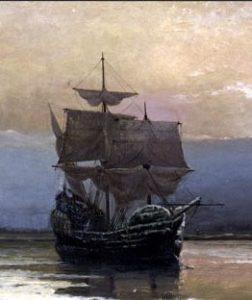 On board the ship the women were facing an even more daunting kind of suffering at the hands of the crew who were now getting sick themselves. Bradford relates; “For they that before had been boon companions in drinking and jollity in the time of their health and welfare, began now to desert one another in this calamity, saying they would not hazard their lives for them, they should be infected by coming to help them in their cabins; and so, after they came to lie by it, would do little or nothing for them but, ‘if they died, let them die.’ But such of the passengers as were yet abord showed them what mercy they could, which ade some of their hearts relent, as the boatswain (and some others) who was a proud young man and wiuld often curs and scoff at the passengers. But when he grew weak, they had compassion on him and helped him; then he confessed he did not deserve it at their hands, he had abused them in word and deed. ‘Oh!’ (saith he) ‘you, I now see, show your love like Christians indeed on to another, but we let one another lie and die like dogs.’”
On board the ship the women were facing an even more daunting kind of suffering at the hands of the crew who were now getting sick themselves. Bradford relates; “For they that before had been boon companions in drinking and jollity in the time of their health and welfare, began now to desert one another in this calamity, saying they would not hazard their lives for them, they should be infected by coming to help them in their cabins; and so, after they came to lie by it, would do little or nothing for them but, ‘if they died, let them die.’ But such of the passengers as were yet abord showed them what mercy they could, which ade some of their hearts relent, as the boatswain (and some others) who was a proud young man and wiuld often curs and scoff at the passengers. But when he grew weak, they had compassion on him and helped him; then he confessed he did not deserve it at their hands, he had abused them in word and deed. ‘Oh!’ (saith he) ‘you, I now see, show your love like Christians indeed on to another, but we let one another lie and die like dogs.’”
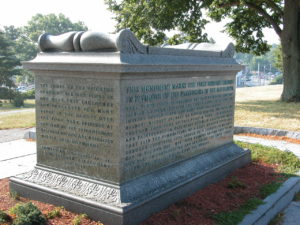 On Cole’s Hill in Plymouth, the Sarcophagus monument honors the suffering of those who died that first winter. After a hurricane hit Plymouth in 1735, the water unearthed some skeletons confirmed to be those who died the first winter in Plymouth, over 115 years before. I like to think that during the Great Awakening (1730’s) God, who was opening human hearts, providentially opened the earth that a current generation might remember the sacrifices of the first one. In additition to the names of those who died that first winter on the front, the back has inscribed words that ring out through the ages regarding the cost of freedom of conscience.
On Cole’s Hill in Plymouth, the Sarcophagus monument honors the suffering of those who died that first winter. After a hurricane hit Plymouth in 1735, the water unearthed some skeletons confirmed to be those who died the first winter in Plymouth, over 115 years before. I like to think that during the Great Awakening (1730’s) God, who was opening human hearts, providentially opened the earth that a current generation might remember the sacrifices of the first one. In additition to the names of those who died that first winter on the front, the back has inscribed words that ring out through the ages regarding the cost of freedom of conscience.
“This Monument marks the First Burying Ground in Plymouth of the Passengers of the Mayflower. Here, under cover of darkness, the fast dwindling company laid their dead, levelling the earth above them lest the Indians should know how many were the graves. Reader! History records no nobler venture for faith and freedom than that of this Pilgrim band. In weariness and painfulness, in watchings often, in hunger and cold they laid the foundations of a state wherein every man, through countless ages, should have liberty to worship God in his own way. May their example inspire thee to do thy part in perpetuating and spreading the lofty ideas of our republic throughout the world!”
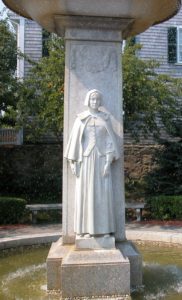
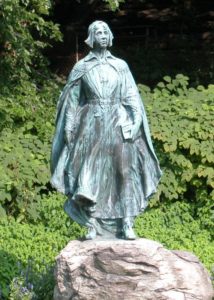 Our children and grandchildren, we pray, will one day look back on these “gilgal stones” of rememberance in the town of Plymouth. The Pilgrim Mother monument, along with the Pilgrim Maid monument, both honor the married and single women who came in 1620. Their sacrifice was unique and significant at a time when it was rare for women, children and families to travel, especially to help plant a church in a wilderness. Without them, however, it would not have been successful.
Our children and grandchildren, we pray, will one day look back on these “gilgal stones” of rememberance in the town of Plymouth. The Pilgrim Mother monument, along with the Pilgrim Maid monument, both honor the married and single women who came in 1620. Their sacrifice was unique and significant at a time when it was rare for women, children and families to travel, especially to help plant a church in a wilderness. Without them, however, it would not have been successful.
William Bradford indicates that he wrote his history “…that their children may see with what difficulties their fathers wrestled in going through these things in their first beginnings, and how God brought them along.” May we honor the God of of our forefathers and those intrepid men, women and children who left us such a shining example of Christian testimony in the midst of suffering! On the base of the Pilgrim Mother monument it reads they brought up their families in sturdy virtue and a living faith in God, without which nations perish!

